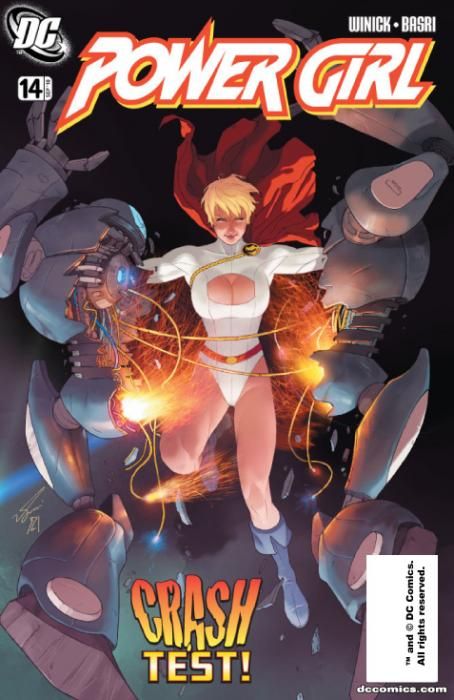The second issue of Judd Winick's and Sami Basri's run is the second issue I've been surprised to enjoy as much as I do. Winick and Basri take the high road and continue to forge their own book, as though last issue was a new #1. They're not continuing the story started by Gray, Palmiotti, and Conner, and it works for this book.
I wouldn't have ever expected Power Girl to lambaste a group of collectors as "butt-monkeys" under the direction of Gray and Palmiotti, but from Winick, it works. Winick writes Karen as a bold, brash, outspoken leader of a company pummeled by one of the worst days in her adult life. That pummeling is metaphoric and literal, as the bank reclamation hits Starrware in the gut while Randall Mikavic -- an arms dealer who gets an upgrade like no other -- hits her everywhere else.
Winick brings Booster Gold in to rally troops to his cause of finding Max Lord (see "Justice League: Generation Lost" for details). Power Girl has no recollection of Max Lord, which frustrates Booster, and suspends the connection that Winick is trying to forge between his two titles.
Basri's art is nothing short of gorgeous. His characters, while carrying a certain manga influence, have a depth to them that pushes them forward from the backgrounds, an effect capably enhanced by Sunny Gho's colors. Gho busts out the bright colors for this issue, supplanting the muted palette from the last issue, making Power Girl's world louder in the process.
Basri makes the most of each and every page, whether it has two panels or six. His Power Girl is strong and sure, but when she's beaten, Basri draws it well. He doesn't overload his pages with cheesecake poses of PeeGee. He draws her as a real person with real actions, expressions, and posture. He also handles the interactions between -- and reactions of -- characters nicely. The characters don't just have expressions on their faces, they emote their condition through Basri's art. Basri's establishing his own on this book, and I couldn't be happier with the end result.
Winick and Basri have developed a cast of characters here that are recognizable and integral to Power Girl's story. In doing so, they've set a nice balance between the mundane (even though it's not) goings-on of Karen Starr's world and the bombastic collisions of Power Girl's adventures.
This issue gives me an idea of what to expect from "Power Girl" going forward, and I like it. Winick is writing this book with straight-forward superhero enthusiasm. Karen charges into action and the scene screams for a theme song to score underneath it. The secret identity side of things is played to the fullest, and the end result is a solid read that I look forward to just as much now as I did with the previous creative team.

